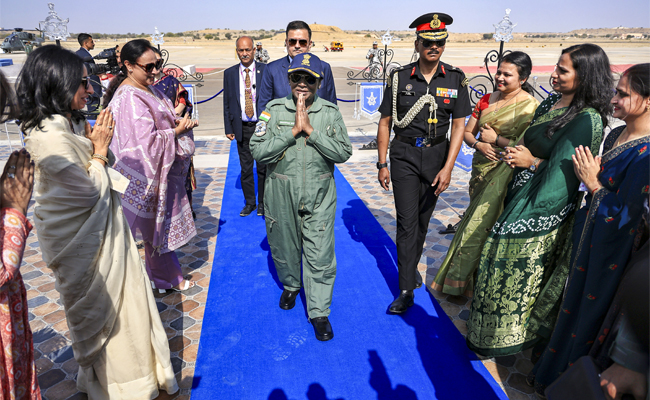Dubai, (PTI): India opener Smriti Mandhana has reached a career-best 741 points as she continues to maintain her third position in the latest ICC Women's T20I Player Rankings for batters released on Tuesday.
The Player of the Match in the second T20I against Australia, which ended in a tie before India won in the Super Over, gained 11 rating points to reach the landmark.
Australia's Tahlia McGrath is the new No.1 in the rankings following her superb performances in the first two matches of the ongoing series against India underway in Mumbai.
The 27-year-old Australian had unbeaten knocks of 40 and 70 and overtook compatriots Meg Lanning and Beth Mooney as well as Mandhana to become the fourth Australian and 12th batter to top the women's T20I rankings, according to ICC.
Mooney had been at the top since August 3 this year when she overtook Lanning.
McGrath is No. 1 after only 16 matches. The last woman to reach the top in fewer matches was West Indies' Stafanie Taylor in 2010 (15 matches) while India opener Shafali Verma has been the fastest in recent years, reaching the top ranking after 18 matches.
Two more India batters, Shafali and Jemimah Rodriques, also figure in the list of top-10 T20I batters, with the former gaining a spot to be at sixth position.
In the T20I ranking for bowlers, India's Deepti Sharma and Renuka Singh Thakur have maintained their third and fourth spots respectively, with England leg-spinner Sarah Glenn up one place to second behind compatriot Sophie Ecclestone.
Let the Truth be known. If you read VB and like VB, please be a VB Supporter and Help us deliver the Truth to one and all.
Bengaluru (PTI): A domestic worker has been arrested for allegedly stealing 12.5 kg of silver articles worth around Rs 35 lakh from the house of her employer here, police said on Friday.
Chaitra has been arrested by the Jeevan Bima Nagar Police Station.
She had been working for the past two-and-a-half years at the residence of a surgeon attached to a reputed hospital in the city, Bengaluru City Police Commissioner Seemanth Kumar Singh told reporters.
According to him, the woman is a native of Davangere and allegedly stole silver utensils and Pooja articles from the house in phases.
“The family had stored about 12.5 kg of silver utensils on the upper floor, which were meant to be used only during festivals."
“She allegedly took one item at a time, pledged it to raise money and spent the amount. To avoid suspicion, she continued to work in the same house,” they added.
A few days before Deepavali, the accused reportedly quit her job.
“When the family opened the bag containing the silver utensils as part of festival preparations, they found the items missing and approached the police,” the Commissioner said.
Based on the complaint, a case was registered and an investigation was launched.
“We questioned former employees and during Chaitra’s interrogation, the theft came to light. We have recovered 12.5 kg of silver articles worth approximately Rs 35 lakh from her possession,” he stated.
A case has been registered and further investigation is in progress.
According to police sources, she cited the need for money for her husband’s cancer treatment, police sources said.





